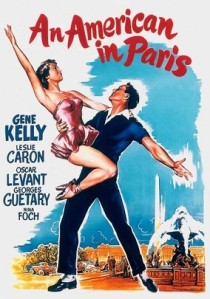Rating: 2 stars (out of 4)
An American in Paris (1951): Directed by: Vincente Minnelli and Gene Kelly. Written by: Alan Jay Lerner. Lyrics by: Ira Gershwin. Music by: George Gershwin. Starring: Gene Kelly, Leslie Caron, Oscar Levant, Georges Guétary, and Nina Foch. Unrated. Running time: 113 minutes.
 Apparently the social cynicism of the previous Oscar winner was too much for the Academy, because they went for just the opposite the following year. As the third musical on my countdown, Paris is certainly better than the previous two (The Broadway Melody and Going My Way) but unfortunately shirks substance for style.
Apparently the social cynicism of the previous Oscar winner was too much for the Academy, because they went for just the opposite the following year. As the third musical on my countdown, Paris is certainly better than the previous two (The Broadway Melody and Going My Way) but unfortunately shirks substance for style.
The film stars Gene Kelly as Jerry Mulligan, an American expatriate who seeks a painter’s life in Paris. Accompanying him, literally and musically, are an unemployed pianist and a moderately successful singer. Mulligan finds himself entangled in romantic drama as he unwittingly pursues the fiancée of his vocalist friend.
Lacking the humorous edge of Singin’ in the Rain, the film offers a paper-thin plot and underused characters (particularly the females). Nothing has a consequence, and any remotely interesting conflict is whisked away by the power of song. I wonder why the filmmakers even bothered with a story, especially when Paris’s merits lie in its choreography (mostly done by Gene Kelly himself) and set design. And while none of the Gershwins’ music offends, it doesn’t really add anything to the flimsy narrative.
Still, the film does manage some humorous moments (my favorite is a dream sequence in which the pianist imagines himself as every member of an orchestra). It even has an impressive sixteen-minute sequence in which Gene Kelly and Leslie Caron dance around several painstakingly crafted Parisian sets. Some parts of the big number attempt to add depth to their relationship; other parts seem like an excuse to just…well…dance.
If you like big budget musicals, you may enjoy this picture. The musical talent involved is undeniable, and Gene Kelly is in terrific form. But is it too much to ask for interesting characters, or a somewhat convincing ending?
Next film: The Greatest Show on Earth, 1952